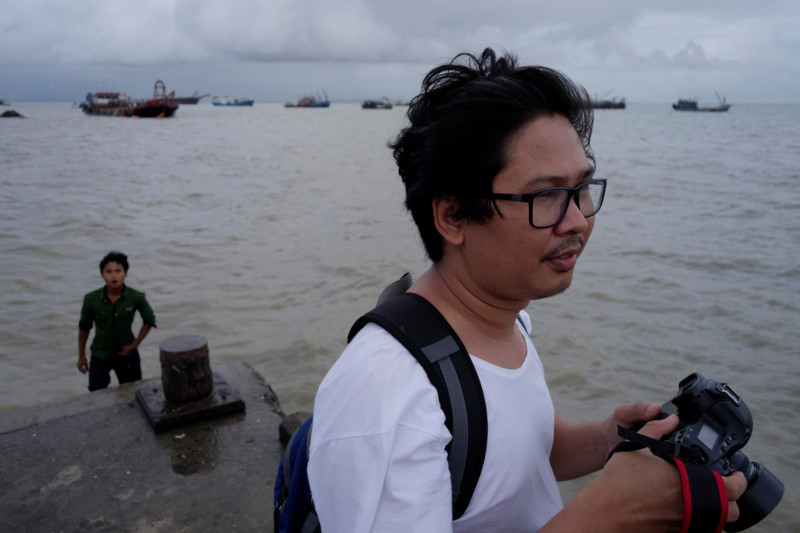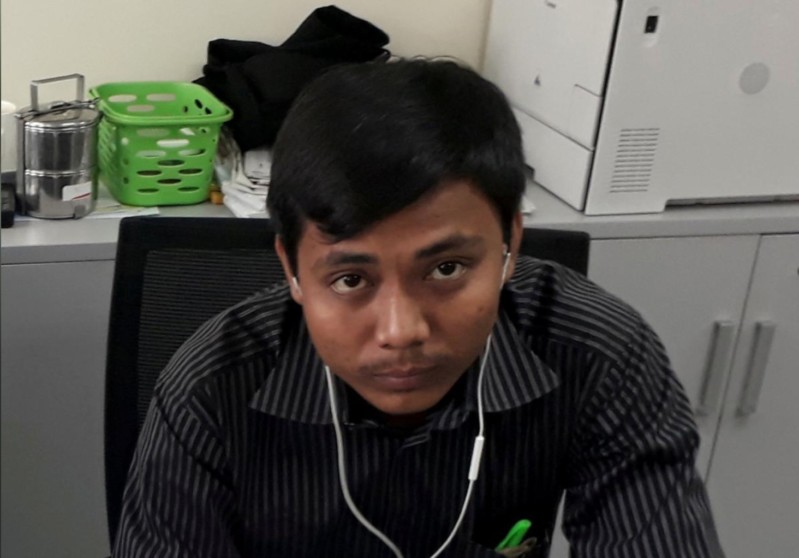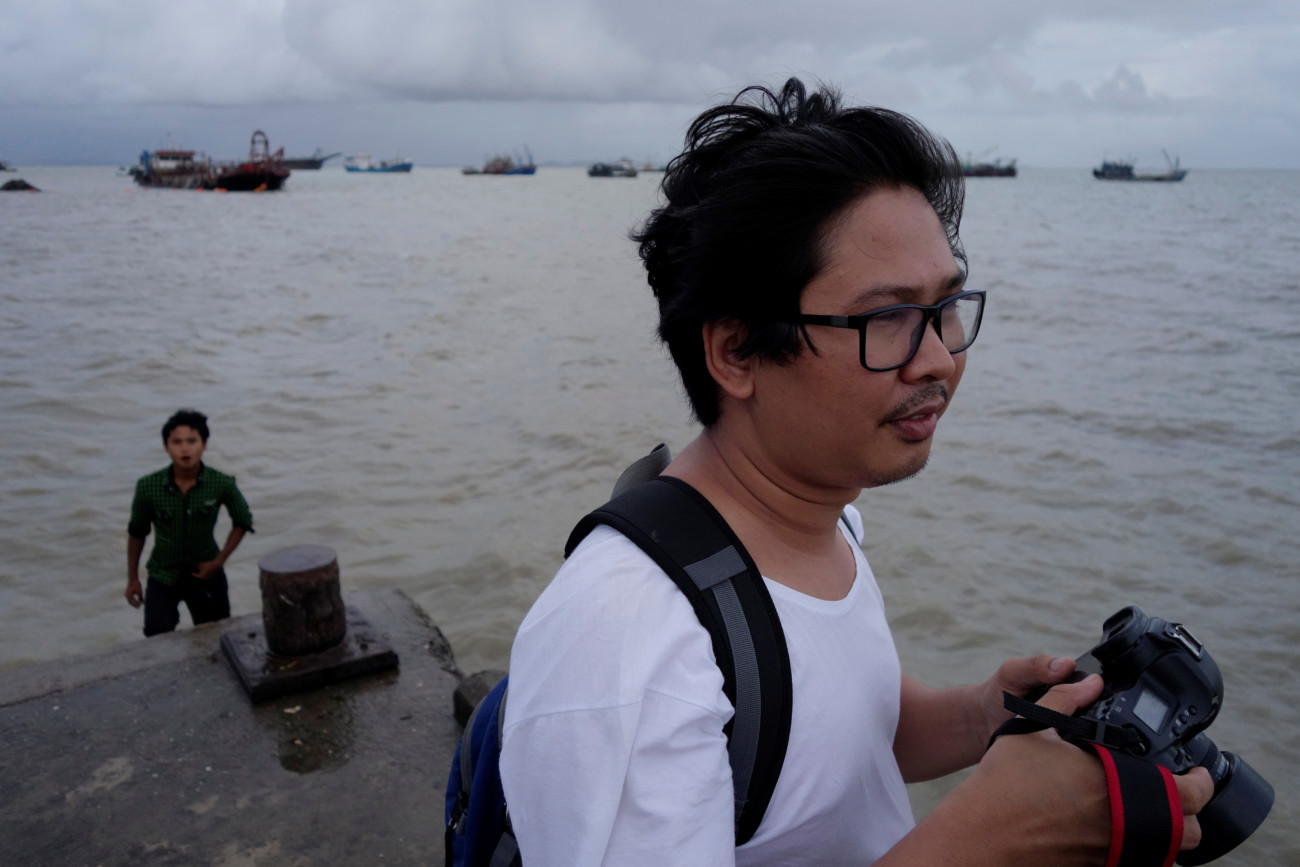Sign up for The Media Today, CJR’s daily newsletter.
YANGON/BANGKOK (Reuters)—In many ways Wa Lone and Kyaw Soe Oo, two Reuters journalists arrested in Myanmar, symbolize their country’s emergence after decades of isolation—both from modest, provincial backgrounds, they worked hard to pursue careers that would have been impossible in the junta era into which they were born.
Following are profiles of the two journalists, who were arrested on December 12 and have been held since then without contact with their families or a lawyer, accused of breaching the country’s Official Secrets Act:
WA LONE
Wa Lone, 31, grew up in Kin Pyit, a village of some 100 households in the Shwe Bo district north of Mandalay, on Myanmar’s dry central plain between the mighty Irrawaddy and Chindwin rivers.
One of five children, his parents were rice farmers and there was little money. His mother died from cancer when he was young.
But he was a good student, according to friends and family, and took a keen interest in news from an early age. One of his brothers, Thura Aung, remembers Wa Lone, aged around 10, watching bulletins on a shared TV in their village.
ICYMI: Hey lottery players! This article might upset you
“Sometimes he would play at being an anchor,” said Thura Aung, 26. “He always said he wanted to be a reporter in the future.”
After finishing school at 16 he enrolled as a student at a government technical university, but left after a couple of semesters because his family could not afford the tuition.

Reuters journalist Wa Lone, who was arrested in Myanmar, is seen working in Sittwe in the state of Rakhine, Myanmar, September 18, 2017. Picture taken September 18, 2017. (REUTERS/Andrew Marshall)
Around 2004 he went to Mawlamyine, Myanmar’s fourth biggest city, living in a Buddhist monastery where his uncle was a monk. In exchange for a place to stay, he would get up at 5am to clean and prepare food for the monks before going to work at a photo services business. Wa Lone showed a talent for design and photography, and soon set up a small photo services shop of his own, which he ran with Thura Aung.
In December 2010, having saved a little money, the brothers moved back to Yangon, where Wa Lone could pursue his boyhood dream. Living in North Okklapa township, near the city’s airport, they re-established their photo services business, while Wa Lone also enrolled in a media training school and later began taking English classes.
Mindy Walker, an American teacher who met him in 2012, recalls a “skinny kid from the village who had little interaction with foreigners.”
He was so nervous he fled her English class the first time he was called on to answer a question.
“We still joke about that moment and he tells every new student in our class that story so that they feel more confident,” said Walker in an email. “His heart is huge and he is always encouraging others to succeed.”
CHARITABLE FOUNDATION
Within five or six months Wa Lone had landed his first job in journalism on the weekly People’s Age in Yangon, where his editor was Pe Myint—now Myanmar’s Minister of Information.
In 2014, he joined the English-language daily Myanmar Times, covering the historic 2015 general election that swept Nobel peace prize laureate Aung San Suu Kyi to power.
“As soon as I met Wa Lone, I knew we had to hire him,” said the paper’s former editor, Thomas Kean. “He was thoughtful, articulate, and clearly cared deeply about journalism.”
As well as providing a platform for him to excel as a journalist, the two years he spent at the Myanmar Times was a significant period in Wa Lone’s life—it was there that he met his wife Pan Ei Mon who works in the paper’s sales and marketing department. The couple married in April last year.
Despite the long hours chasing stories and studying, Wa Lone has still found time to write a children’s book, The Gardener, a story in Burmese and English with an environmental message that draws on his own rural roots.
He co-founded the Third Story Project, a charitable foundation that produces and distributes stories that aim to promote tolerance between Myanmar’s different ethnic groups, and is involved in projects working with orphans.
ICYMI: Bad news for Vice, Mashable and BuzzFeed
Many of his weekends off have been spent visiting poor rural villages—much like the one where he grew up.
“He brings story books from Third Story and gives them to children,” said Pan Ei Mon. “He reads to them and does painting competitions and sings with the children.”
Wa Lone joined Reuters in July 2016 and quickly made his mark with in-depth stories on sensitive subjects including land grabs by the powerful military and the murder of prominent politician Ko Ni, as well as uncovering evidence of killings by soldiers in the northeast.
His reporting on the crisis that erupted in northwestern Rakhine state in October 2016 won him a joint honorable mention from the Society of Publishers in Asia in its annual awards.
He returned to Rakhine this year, after attacks by Rohingya Muslim militants on security forces in August triggered a crackdown by the army.
Covering such subjects is not easy in a country where the transition from decades of junta rule is proving painful.
“His bravery over the past year, and particularly since August 25, has been incredible. It’s hard to describe the tide of ill-feeling towards journalists who question the military-government narrative on Rakhine,” said Kean, his former editor.
“As soon as one of my colleagues said, ‘Have you heard about Wa Lone?’ I knew he’d been arrested. His reporting has undoubtedly made him a target. It’s heartbreaking, infuriating, and completely unsurprising.”
KYAW SOE OO
Family and friends of Kyaw Soe Oo say he has always had a love of writing, and composed poetry before becoming a journalist.
Min Min, the founder of the Root Investigative Agency, where Kyaw Soe Oo worked after starting his reporting career with the online Rakhine Development News, described the 27-year-old as “a joyful person” who had many friends.
“When I first met him in 2013, he was a poet not a journalist and not interested in journalism yet,” said Min Min.

Reuters journalist Kyaw Soe Oo, who is based in Myanmar, poses for a picture at the Reuters office in Yangon, Myanmar December 11, 2017. (REUTERS/Antoni Slodkowski/File Photo)
An ethnic Rakhine Buddhist, Kyaw Soe Oe grew up in the state capital Sittwe, and was one of five siblings.
“He is a good elder brother,” said his sister, Nyo Nyo Aye, adding that her brother always stood out from the crowd.
“He was always with books. He went to the book store or secondhand booksellers. He spent all his money buying books.”
Childhood friend Zaw Myo Thu said he avoided becoming caught up in the communal tensions between Rakhine Buddhists and Rohingya Muslims that have seethed in the city since the upheavals in 2012.
“He wrote poems. He loved to read,” he said. “He never fought with anyone.”
But it was that conflict which drew him into journalism, covering Rakhine issues. He had been with Reuters since September, reporting on the army’s crackdown in the aftermath of militant attacks on security forces on August 25.
“As a journalist, he will cover news, but I think he will do it fairly because he does not discriminate between races,” said his sister Nyo Nyo Aye. “He just realizes all are human.”
For Reuters, Kyaw Soe Oo worked on an investigative story about Myanmar’s plan to harvest the crops of Rohingya farmers who fled to Bangladesh, and reported on how some Buddhists were enforcing local-level segregation in central Rakhine.
“He didn’t tell me about the work and I never asked,” said his wife, Chit Thu Win, with whom he has a 3-year-old daughter. “I believed in him that he is doing the right thing and he’s just following his passion. He wanted to be a writer.”
Reporting by Thuy Thuy Aung, Shoon Naing, Antoni Slodkowski, Simon Lewis, Andrew R.C. Marshall, and Yimou Lee; Writing by Alex Richardson; Edited by Martin Howell.
ICYMI: Explosive BuzzFeed scoop raises eyebrows
Has America ever needed a media defender more than now? Help us by joining CJR today.



